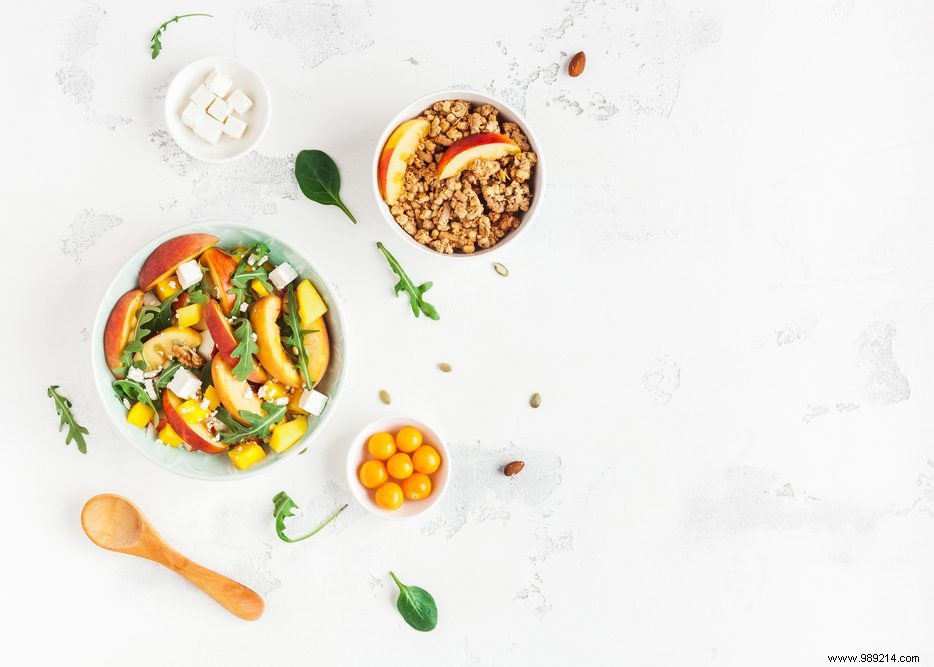
Healthy food? How difficult is that and what exactly counts when it comes to healthy nutrients? Check out our checklist of guidelines.
For more than a year, the Nutrition Center launched the renewed Wheel of Five, the guidelines for healthy nutrition. One of the most important things:variety. With the checklist below you can help yourself on your way.
What counts?
Fresh fruit and frozen fruit, fresh vegetables, prepackaged vegetables from the refrigerator, frozen vegetables, canned and canned vegetables.
How often?
Fruit up to twice a day. Vegetables unlimited and preferably with every meal.
Serving Size
80 to 100 grams is about one piece of fruit. These are, for example, three tablespoons of frozen fruit, an apple or two kiwis. A banana weighs heavier:150 grams on average. For example, eat one banana and one kiwi. You can't actually eat enough vegetables, but eat at least 200 grams per day.
What should you pay attention to?
Vegetables and fruits are healthy. Try to make sure this group makes up the bulk of the food you eat every day.
What counts?
Whole-wheat bread or other whole-grain products such as whole-wheat crackers if they contain at least 25 percent whole-wheat flour, breakfast cereals, whole-wheat pasta and (sweet) potatoes.
How often?
Eat whole-wheat bread or other whole-grain products, such as breakfast cereals, every day. But beware:sugar (cane sugar, honey), sugared dried fruit, coconut chips, salt and/or fat are often added to breakfast cereals.
Serving Size
Eat at least 90 grams of bread, cereal, pasta or potatoes every day.
What should you pay attention to?
The products are a good source of carbohydrates. These provide energy and are therefore especially good to eat before exercising.
What counts?
Eggs, fresh, steamed, smoked and fresh frozen fish, white and red meat.
How often?
Eat fish once a week, preferably fatty fish such as salmon or mackerel. Limit the consumption of red meat and especially processed meat as much as possible. You can eat eggs every day.
Serving Size
A fish dish can contain about 100 grams of fish per person. Eat a maximum of 500 grams of meat per week, of which a maximum of 300 grams of red meat (this includes meats for your bread). For eggs, the Nutrition Center recommends 2 or 3 pieces per week, but that also depends on what else you eat.
What should you pay attention to?
What counts?
Fresh and canned pulses, ready-to-eat plant-based meat substitutes such as tofu, unsalted nuts and dairy products such as cottage cheese and cheese.
How often?
Legumes once a week, nuts or peanut butter every day without salt, a portion of milk, cheese, cottage cheese and/or yogurt every day.
Serving Size
Eat no more than 15 grams of nuts (paste), make sure your dairy portion fits in a normal bowl, cut small slices of cheese and choose goat cheese, mozzarella and not fatty cheeses such as brie. Eat at least 200 grams of legumes per week. For (ready-to-eat) meat substitutes, follow the guidelines for meat and fish if you are a vegetarian.
What should you pay attention to? Legumes have a weekly recommendation, not a daily recommendation, so the salt intake with legumes in cans or glass is healthy on average over seven days. If you eat legumes several times a week, make sure to choose products such as peas without added salt. You can of course also buy them fresh or dried and cook them yourself.
What counts?
Soft margarines from a tub and vegetable oils, such as rapeseed oil,
sunflower oil and olive oil.
How often?
You can use these products every day.
Serving Size
Be careful with your portions and only use what you need to prepare dishes. Do not use more than 15 grams.
What should you pay attention to?
There are also fats such as butter, hard margarines and cooking and frying fats. These are more often saturated fats, which are less healthy for you.
What counts?
Water, tea and filtered coffee without sugar, green and black tea, filtered coffee, espresso. The better the coffee is filtered, the lower the content of the LDL-cholesterol-raising cafestol in the coffee.
How often? You can drink all of the above drinks every day. So this does not include soft drinks and fruit juice.
Serving Size
Drink a maximum of three to four large cups of tea per day. You can drink unlimited water, about 1.5 to 2 liters per day. You can take about 400 milligrams of caffeine per day without expecting any negative effects. That is about four cups of coffee a day, but try to stick to three or less.
What should you pay attention to?
Some (soft) drinks contain a lot of sugar, check the label. It is better not to drink alcohol, or in any case no more than one glass a day.